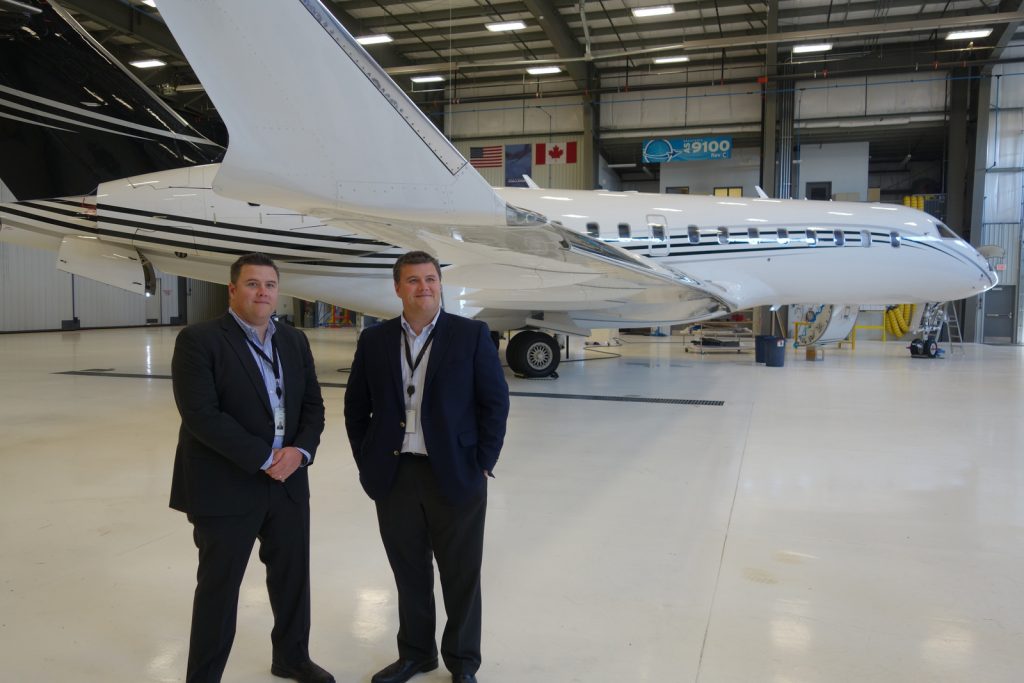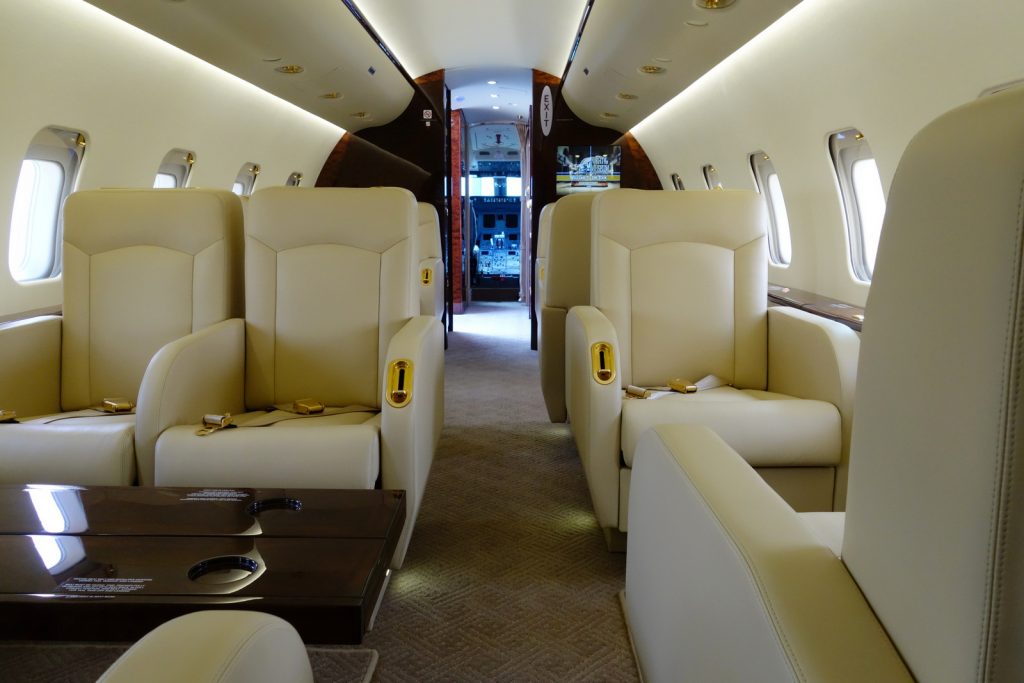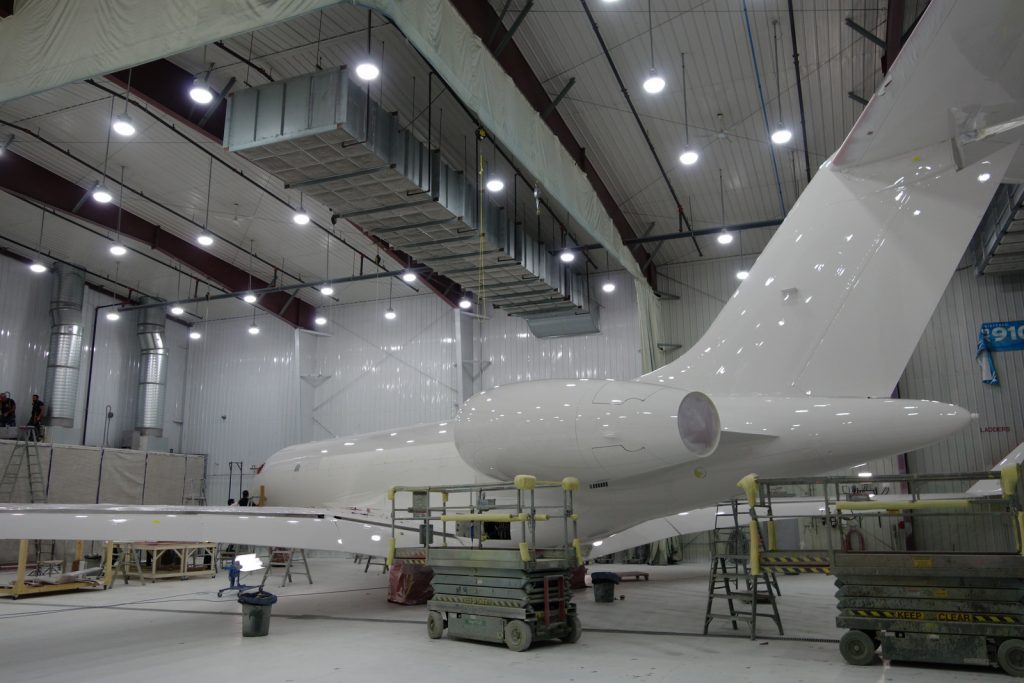Written for Flightglobal – NBAA 2014
It is difficult to tell the difference between Bombardier’s CRJ-200 regional jet and the Challenger 850 corporate aircraft. It is equally difficult to tell the difference between Sean and Eric Gillespie, Vice Presidents of Flying Colours. Along with their father, John, the twin brothers are guiding the corporate jet completion company through an ambitious growth plan – and the Gillespies and the jets are tightly linked.
Flying Colours has been in operation for over 25 years. The Canadian company has grown from a modest aircraft paint facility in Peterborough, Ontario, Canada, to having international locations that specialize in business aircraft completions, refurbishment and conversions, along with full MRO, paint and avionics support and upgrades. The company has worked on completions of corporate and special mission aircraft, from Beechcraft King Air and Dash 8 turboprops, all the way up to Bombardier, Falcon, and Gulfstream aircraft. The Peterborough head office has 13,900 square metres (150,000 square feet) of full-service facilities, and the St. Louis, Missouri operation is 6,040 square metres (65,000 square feet).
Completions of “green” Bombardier Challenger 850 planes are performed exclusively by Flying Colours, complemented by its successful “CRJ ExecLiner” conversions. That program has been running for almost ten years. Sean says that “we take a CRJ-200, strip out the passenger seats and fittings, install a new interior, new paint, and add an auxiliary fuel system. It’s a good charter airplane. It looks like a new [Challenger] 850 and runs like a new 850, even if it has 25,000 hours on it.”
“The -200 is built to last. It’s got an 80,000 hour airframe, and no one is going to take it there,” Eric Gillespie adds. “We’ve done conversions of planes with 20,000 hours or more, but most are under that, one had just 3,000 hours.”
Flying Colours has delivered 16 ExecLiners in the VIP configuration, and an additional two in progress. Four converted aircraft with a corporate shuttle interior are awaiting delivery. Sales and marketing of the ExecLiner is focussed on Asia, Latin America and Africa.
To support the worldwide expansion of its sales efforts, earlier this year Flying Colours announced a partnership with Bombardier to provide interior refurbishment and reconfiguration services at Bombardier’s new Singapore Service Centre at Seletar Airport. “We have clients who come back to us from that region all the time. This will make it easier for them,” says Eric. The Singapore facility is expected to be operational early next year.
The brothers estimate that completions and support for Bombardier aircraft make up about 75% of the work done by Flying Colours. And they’re working towards adding capability to complete “special mission” aircraft, based on the CRJ-700 and -900, and Global airframes. “We’ve been focussed on the “pretty stuff”, with our ongoing completions. But the defence market is something that we’ve been trying to tap into for a while. The long-term goal is to be able to do the whole missionized project, and we’ll grow into it,” says Sean. The company is currently completing a CRJ-700 with a special mission VIP/commuter interior, part of a seven aircraft contract from Bombardier for an undisclosed Chinese customer.
With an eye to this market segment, Flying Colours has expanded its in-house design engineering team. ‘We’ve brought on six senior engineers, and we’ll probably add another six over the next few months. Most of our engineers are based in St. Louis,” says Sean. “It’s an investment in people and software,” he adds. Another investment was the implementation of LEAN principals and programs to mirror OEM standards, along with the approval of AS9100 certification. These efforts seem to be paying off, with Flying Colours in the process of finalizing a multi-aircraft project, based on the Global airframe. “They are not regular completions,” says Sean.
In addition to the new Singapore facility, the first phase of the company’s development plans at Peterborough airport recently opened, with a 20,000 square foot hangar expansion. An ambitious second phase will see a tripling of Flying Colours large-cabin aircraft completion capability to nine bays, with a new two bay, state-of-the-art paint facility. This additional 45,000 square foot facility will be able to handle larger corporate aircraft. Sean says, “Over the years, we’ve been approached on the Boeing [BBJ] and Airbus [ACJ] completions many times. We’ve had some inquiries about CSeries VIP completions from different clients, too. This facility will be able to accommodate them. We’re definitely moving in that direction.”
The company’s St. Louis operation will double in size in the third phase of the growth plan. A new paint facility will be included in the expansion to that site, which recently added approval for work on the Challenger 350 and Learjet 70/75 series. Having the St. Louis facility is an advantage to the company, says Sean: “We can give our clients the option to have their aircraft worked on in Canada or the United States.”
“Flexibility is the key in this business. We don’t say ‘no’ a whole lot,” says Sean Gillespie. At the same time, the brothers agree that it’s important to manage expectations. For example, one of the first things completion clients now ask for is full high-speed internet connectivity. “Some can stomach the costs, some not, and they expect it to run the same [as on the ground], but it doesn’t. I can send emails, but no attachments, and I can’t stream video. But the technology is improving, and it’s coming,” Eric Gillespie says.
Sean Gillespie also knows that Flying Colours is unique amongst its competitors. “The fact that we’re a privately-owned, family-run business is something that our clients understand and appreciate,” he says.
Read the original story in Flightglobal’s NBAA 2014 special edition


